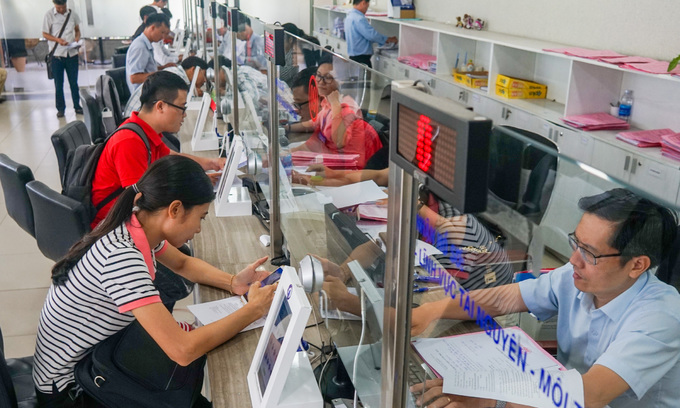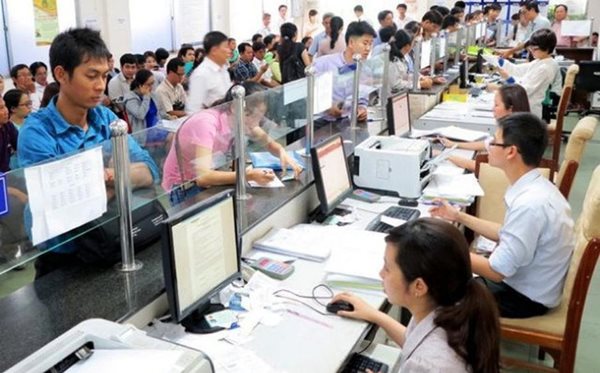Civil servants at central, provincial and district levels in Vietnam

Vietnam law has regulations on civil servants at central, provincial and district levels. Let’s find out this issue with Lawyer X through the following situation: “Dear Lawyer! What are Obligations and rights of civil servants at central, provincial and district levels in Vietnam? How are civil servants categorized? Thanks for answering me!”
Legal grounds
- 2015 Vietnam Law on Cadres and Civil servants
Regulations on Civil servants at central, provincial and district levels
– Civil servants defined in Clause 2, Article 4 of Vietnam Law on Cadres and Civil servants include:
+ Civil servants working in agencies of the Communist Party of Vietnam, socio-political organizations;
+ Civil servants working in state agencies;
+ Civil servants in the leading and managerial apparatuses of non-business units;
+ Civil servants working in agencies and units of the People’s Army who are other than officers, professional military personnel and defense workers; civil servants working in agencies and units of the People’s Police who are other than officers and professional non-commissioned officers.
– The Government shall specify this Article.
Obligations and rights of civil servants
– To perform obligations and exercise powers defined in Chapter II and other relevant provisions of Vietnam Law on Cadres and Civil servants.
– To perform tasks and exercise powers in accordance with the Constitution and laws.
– To take responsibility to competent agencies and organizations for the performance of tasks and exercise of powers as assigned.
Categorization of civil servants
– Based on their appointed ranks, civil servants are classified into:
+ Class A including those appointed to the senior-specialist or equivalent rank;
+ Class B including those appointed to the principal-specialist or equivalent rank;
+ Class C including those appointed to the Specialist or equivalent rank;
+ Class D including those appointed to the technician or equivalent rank or employee rank.
– Based on working positions, civil servants are classified into:
+ Civil servants holding leading or managerial posts;
+ Civil servants not holding leading or managerial posts.
Conditions for registration for civil servant recruitment
The recruitment of civil servants must be based on task requirements, working positions and payroll quotas.
– A person who meets all the following conditions, regardless of nationality, gender, social status, belief and religion, may register for civil servant recruitment:
+ Bearing the sole nationality of Vietnamese;
+ Reaching full 18 years of age;
+ Filing an application for recruitment; having a clear personal record;
+ Possessing relevant diplomas an+or certificates;
+ Possessing political qualities and good ethics:
+ Being physically fit for the job;
+ Meeting other conditions required by the working position for which h+she applies.
– The following persons may not register for civil servant recruitment:
+ Not residing in Vietnam;
+ Having lost civil act capacity or having such capacity restricted;
+ Being examined for penal liability; currently serving a criminal sentence or court ruling or having completely served such a sentence or ruling but such criminal record has not yet been remitted, or serving the administrative measure of confinement to a medical treatment establishment or a reformatory.

Methods of civil servant recruitment
– Civil servants shall be recruited through examinations, except for cases specified in Clause 2 of this Article. The form and contents of examination to recruit civil servants must be suitable to each sector and occupation, ensuring that persons with appropriate qualities, qualifications and capabilities are selected.
– Persons who meet all conditions specified in Clause 1, Article 36 of Vietnam Law on Cadres and Civil servants and commit to voluntarily work for at least 5 years in mountainous, border, island, remote, deep-lying or ethnic minority or special socio-economic difficulty-hit areas may be recruited through selection.
– The Government shall specify the recruitment of civil servants through examination or selection.
Principles for civil servant recruitment
– Ensuring publicity, transparency, objectivity and legality.
– Ensuring competitiveness.
– Selecting proper persons who meet task and working position requirements.
– Prioritizing recruitment of talented persons, persons with meritorious services to the country and ethnic minority persons.
Agencies recruiting civil servants
– The Supreme People’s Court, the Supreme People’s Procuracy and the State Audit may recruit, and decentralize the recruitment of, civil servants in agencies, organizations and units under their respective management.
– The Office of the National Assembly and the Office of the President may recruit civil servants in agencies and units under their respective management.
– Ministries, ministerial-level agencies and government-attached agencies may recruit, and decentralize the recruitment of. civil servants in agencies, organizations and units under their respective management.
– Provincial-level People’s Committees may recruit, and decentralize the recruitment of, civil servants in agencies, organizations and units under their respective management.
– Agencies of the Communist Party of Vietnam and socio-political organizations may recruit, and decentralize the recruitment of, civil servants in agencies, organizations and units under their respective management.
Civil servant ranks and rank appointment
– Civil servant ranks include:
+ Senior specialist and equivalent;
+ Principal specialist and equivalent;
+ Specialist and equivalent;
+ Technician and equivalent;
+ Employee.
– Rank appointment must ensure the following conditions:
+ Appointed persons meet all professional criteria of the rank;
+ Rank appointment is decided by competent persons and ensure the civil servant structure of the agency, organization or unit.
– Rank appointment shall be made in the following cases:
+ The recruited person has completed the probation regime;
+ The civil servant has passed a rank promotion examination;
+ The civil servant is shifted to an equivalent rank.
Shift of civil servant ranks
– Rank shift means the appointment of a civil servant holding a rank in a profession to a rank of the same specialized or professional level of another profession.
– To be shifted to another rank, a civil servant must possess all specialized or professional qualifications as required by the rank h+she is shifted to and relevant to the assigned tasks and powers.
– A civil servant who is assigned tasks irrelevant to the specialized or professional qualifications of the rank h+she is holding shall be shifted to a suitable rank.
– No rank promotion and salary raise are allowed upon rank shift.
Civil servant rank promotion
– Rank promotion must be based on working positions, suitable to the civil servant structure of the agency, organization or unit concerned, and made through examination.
– Civil servants who meet all criteria and conditions for assuming working positions of a higher rank may register for rank promotion examination.
– Rank promotion examinations shall be organized on the principles of competitiveness, publicity, transparency, objectivity and legality.
Criteria and conditions for registration for rank promotion examinations
– When agencies, organizations and units need to employ civil servants in working positions of ranks for which examinations are organized, their civil servants may register for sitting such examinations.
– Civil servants registering for rank promotion examinations must possess political qualities, ethnics and specialized or professional qualifications and capabilities meeting the requirements of ranks for which examinations are organized.
Organization of rank promotion examinations
– The contents and forms of civil servant rank promotion examinations must suit the specialized or professional levels of the ranks for which examinations are organized, ensuring the selection of civil servants with specialized or professional capabilities and qualifications relevant to the criteria for ranks for which examinations are organized and meeting task requirements.
– The Ministry of Home Affairs shall assume the prime responsibility for, and coordinate with concerned agencies and organizations in, organizing civil servant rank promotion examinations.
– The Government shall issue specific regulations on civil servant rank promotion examinations.
Please see more:
- Instructions for exclusive registration of company logos in Vietnam
- Service of changing the legal representative of Vietnamese enterprises
Services of Lawyer X
Prestigious professional services: Firstly, the team of consultants and consultants for many years in the field of civil status, and customer support.
On-time: Certainly, with the motto “Get your lawyer right at your fingertips”, we ensure the service always performs on time. The rights and interests of customers always come first.
Cost: Besides, Lawyer X’s service costs are highly competitive; depending on the nature of the particular case. So, we want our guests to have the best possible service experience. Therefore, costs which guaranteed to be the most suitable and economical for customers.
Confidentiality of client information: Finally, all personal information of clients Lawyer X will be 100% confidential.
If you need any further information, please contact LSX Law firm: at +84846175333 or Email: hoangson@lsx.
Frequently asked questions
– Based on their appointed ranks, civil servants are classified into: Class A including those appointed to the senior-specialist or equivalent rank; Class B including those appointed to the principal-specialist or equivalent rank; Class C including those appointed to the Specialist or equivalent rank; Class D including those appointed to the technician or equivalent rank or employee rank.
– Based on working positions, civil servants are classified into: Civil servants holding leading or managerial posts; Civil servants not holding leading or managerial posts.
The recruitment of civil servants must be based on task requirements, working positions and payroll quotas.
The following persons may not register for civil servant recruitment:
+ Not residing in Vietnam;
+ Having lost civil act capacity or having such capacity restricted;
+ Being examined for penal liability; currently serving a criminal sentence or court ruling or having completely served such a sentence or ruling but such criminal record has not yet been remitted, or serving the administrative measure of confinement to a medical treatment establishment or a reformatory.
Conclusion: So the above is Civil servants at central, provincial and district levels in Vietnam. Hopefully with this article can help you in life, please always follow and read our good articles on the website: lsxlawfirm.com




